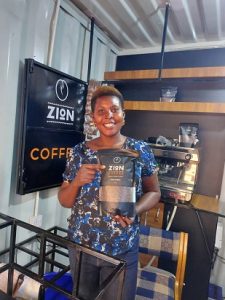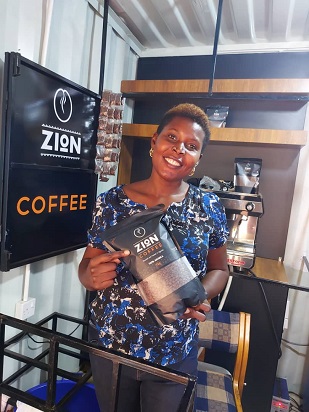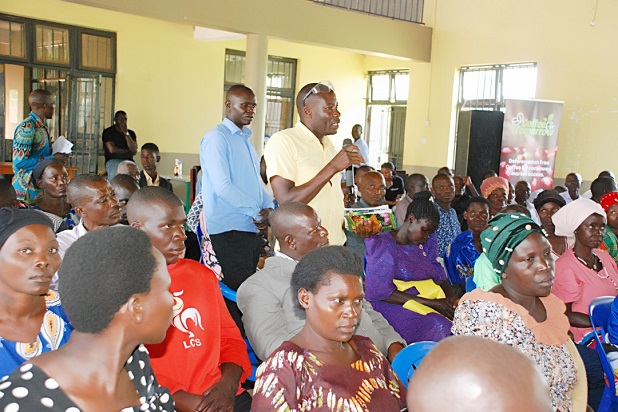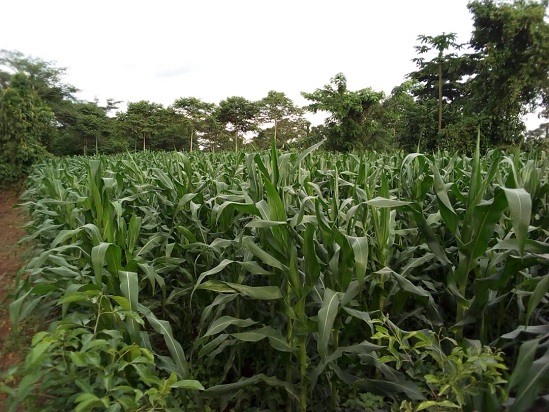Jamillah Kenyange wants to grow domestic coffee consumption under her brand, Zion Coffee
Ugandan women are increasingly joining coffee business. Jamillah Kenyange is one of the women entrepreneurs doing coffee value addition under Zion Coffee brand.
Kenyange didn’t know much about coffee, but the fact that her husband is a coffee drinker, she was forced to know more about the world’s most traded item- after oil.
This is how she fell in love with coffee to the extent that she quit her job as Compliance Manager at PMTS Ltd, to concentrate on coffee value addition. She wants to play a big role in growing domestic coffee consumption in Uganda.
Business Focus recently had an exclusive interview with Kenyange about her entrepreneurship journey with Zion Coffee and her future plans.
Below are the excerpts of the interview;
Q: Briefly tell me about yourself and what inspired you into coffee business?
A: My name is Jamillah Kenyange, a coffee entrepreneur and the brain behind Zion Coffee. In 2022, I retired from formal employment to concentrate on growing Zion Coffee brand. I was a Compliance Manager at PMTS, the distributors of Airtel, UBL, Unilever and Coca-Cola. I worked for this company for seven years.
Personally, I didn’t know much about coffee until 2012 when I went for a trade show in Lugogo and saw a few coffee brands. I got interested to know more about coffee; I read more literature about coffee but didn’t go far; I didn’t take up any coffee business because I didn’t have anyone to consult until towards the end of 2020 when my husband introduced me to the proprietor of Volcano Coffee, Gerald Katabazi. My husband is a coffee drinker, so one day I came along with him to Volcano Coffee and that’s when I saw a roasting machine and met Katabazi, who was passionately talking about coffee. The vibe was high, so I sought deeply on how I can join the coffee business. I continued talking to Katabazi and along the way, I met many coffee stakeholders including farmers. I decided to come up with my own brand and since I am a spiritual person, I came up with Zion Coffee. After the name, the biggest challenge was how to get started. My husband had told me about cold brew coffee (coffee served cold and brewed using cold water). I did a lot of research about it and in the process, I convinced my younger sister who was working in the coffee field at a farm level, to take up a barista course at Volcano Coffee. She learnt more about coffee quality management and so many things about coffee. We now came up with cold brew coffee, a ready to drink product but couldn’t stay for long (without going bad) because we didn’t want to use preservatives.
Q: So, how did you proceed with the cold brew coffee idea?
A: We decided to open up an outlet at Akamwesi Complex, Nakawa where we serve cold brew coffee and other coffees as research to have cold brew coffee bottled is ongoing. Coffee consumption in Uganda is still so low, thus we needed to do a lot to introduce our brand to Ugandans and see them drink more coffee. My goal is to increase domestic coffee consumption. I want to see more ordinary Ugandans drink coffee. That’s how the idea of adding value to coffee came up. In 2022, we started ground coffee and selling roasted coffee beans. I started with the smallest pack of 50gms which I sell at Shs3000; I also have 100gms, 200gms, 500gms and 1Kg.
Q: How easy or difficult was it for you to sell your coffee products since you were still employed?
A: I started selling coffee when I was still employed. I would go to work with coffee in my laptop bag and would sell it to my colleagues at work. I had the opportunity to travel from Kampala to many upcountry towns. Every time I travelled upcountry, I would go with coffee packs and the cold brew which I mainly sold to my colleagues at work, so people came to appreciate the product.
Most importantly, people who had never tasted coffee, eventually started tasting it, so for me that was satisfaction that in much as there’s still so much misconceptions about coffee, there’s also a person who would like to try it out.
The availability of coffee in the market is key because people are used to finding it in supermarket shelves but when you walk into someone’s office with a coffee product, chances are high that even those who have never tasted it will buy and try it out for the first time. My colleagues at work introduced me to other buyers. I remember I would leave the field with at least a Shs20,000 note, Shs30,000 or a Shs50,000 and sometimes Shs100,000. It gave me mileage as a person but also hope about what I was selling.

Q: At what point did you consider quitting formal employment to concentrate on the nascent coffee business?
A: I fully retired from formal employment in August 2022 and this was specifically to grow and promote my personal brand. I knew the decision I made wasn’t easy. I knew the business I was getting into needed a lot of commitment, time and money, so for me I couldn’t divide the time. I am a kind of person who wants to give my best to something I commit to do. It would also be unfair to be selling coffee and at the same time employed somewhere, it means I would divide my quality time to my personal business and my employer, so I decided to quit.
At the time, I had some little money to get me started. I looked at other ways on how I can bring the coffee to ordinary Ugandans. I wanted to start a coffee shop or cafe but it was so expensive, so I decided to start with a serving/selling point at Akamwesi Complex, Nakawa and started my first coffee outlet with about Shs20m from my savings. I looked at the different prices of coffee in the market and came up with a favourable price for an ordinary person like students or boda boda riders and put the price at Shs3,000 for black coffee and Shs5,000 for milk coffee.
I opened the outlet in January 2023 but it has not been easy. On the first day, we didn’t sell any cup of coffee, the second day, pretty the same and on the third day, one student came and bought a cup of coffee.
That was our joy. On the 4th day, we sold two. As of now, we averagely sell five cups of coffee per day. That’s exciting for us because the journey we have taken is getting somewhere. We also sell snacks to ensure we survive.
Q: How do you ensure that the coffee you process and sell is of good quality?
A: We mind about the quality of coffee that we serve. We deal with farmers through our contacts that pick the best coffee for us. They ensure that farmers apply and meet the required best practices so that we have the best coffee in the cup. For now, we mainly serve Arabica because of some sweetness. We also serve Robusta on orders. Both Arabica and Robusta are great coffees and we want to promote both of them in Uganda.
Q: What’s your current production capacity and how are sales like on average per month?
A: In a month, we can at least produce 20kgs of ground coffee and sell all of them. Our biggest buyers are the people I used to supply when I was still employed. They still order and we supply them. We also have a few new customers who are coming onboard. Those flying out also like and buy our coffee although these are one-offs.
Q: What key challenges are you facing as a young entrepreneur in coffee value addition?
A: One of the biggest challenges is that coffee isn’t known by many consumers in Uganda. Many know tea leaves because there are many misconceptions about coffee; some relate it to health issues yet coffee has several proven health benefits. Many don’t even have a doctor’s report but will tell you they can’t drink coffee. Some say women don’t take coffee because it dehydrates them which isn’t true. Others say coffee keeps someone awake which is also not true (It’s about how you drink coffee and the timing).
Government has also not done much in sensitizing Ugandans the benefits of drinking coffee yet Uganda is a big coffee producing country. For young entrepreneurs into coffee value addition, the process of certification isn’t easy. More sensitization needs to be done on these processes by concerned Government agencies. What compliance areas should young entrepreneurs look out for?
There’s also the issue of financing. I need more capital to grow the business but access to cheaper capital is a big challenge. Some people have good ideas but lack affordable credit.
UCDA should also have regular trainings on coffee related matters.
Q: Where do you want to be in the near future?
A: My future plan is to have our brand grow locally and play a big role in increasing domestic coffee consumption. In future, we also intend to join the coffee export business. Our target is the export market because it has a large market for coffee and offers interesting opportunities.
A: I would like to appreciate all the women who have joined the coffee industry because it has been largely a male-dominated industry. I see women coming up with great innovations in the coffee industry which is commendable. I have met several of them with good brands which shows that indeed the future is women! The future is great for us and we can play a big role in this country’s economic growth and development. I also want to tell women out there not to fear; let’s put minds together and share opportunities. If you want to grow alone, you’ll never grow.
I need also want to challenge women to take up this lucrative business and I am willing to support them with the knowledge I have acquired.







Thank you for sharing this amazing story
Thank you for taking time to talk to us .